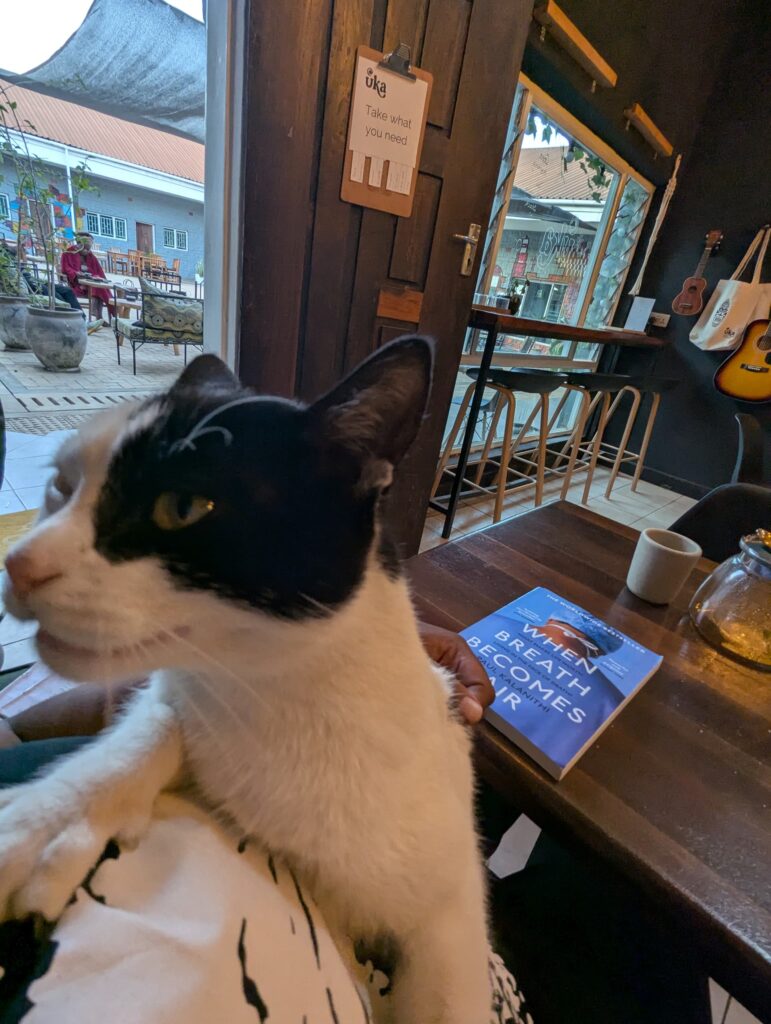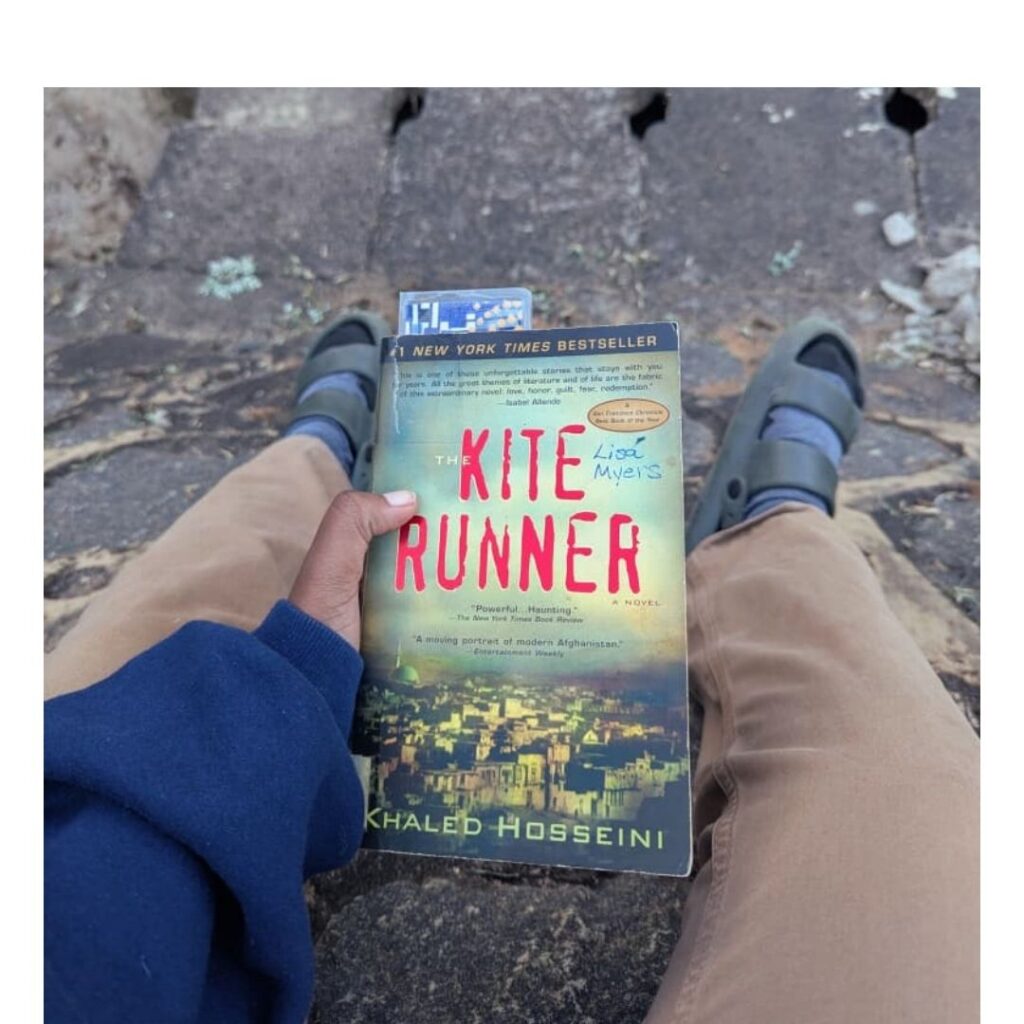
What makes life worth living in the face of death? What do you do when the future, no longer a ladder toward your goals in life, flattens out into a perpetual present? What does it mean to have a child, to nurture a new life as another fades away? These are some of the questions Kalanithi wrestles with in this profoundly moving, exquisitely observed memoir.
Paul Kalanithi died in March 2015, while working on this book, yet his words live on as a guide and a gift to us all. “I began to realize that coming face to face with my own mortality, in a sense, had changed nothing and everything,” he wrote. “Seven words from Samuel Beckett began to repeat in my head: ‘I can’t go on. I’ll go on.'” When Breath Becomes Air is an unforgettable, life-affirming reflection on the challenge of facing death and on the relationship between doctor and patient, from a brilliant writer who became both.
Some time ago, my friend Rudo told me she was in the neurosurgery department at Queens. I made an ignorant assumption and said, “well at least it’s not that busy.” To which she laughed and said, “do you know how many motorcycle head injuries come in by the day.” Reading this book, that’s all I couldn’t think of.
I’m friends with a looot of doctors. I’ve seen just how busy it gets. Been there as they’ve conversed with each other, spewing medical terms so casually as if they were discussing the weather. I’ve seen them lose weight and regain it sometimes. Seen their tired faces after a long night of being on call.
When they’ve apologised for not being around I’ve offhandedly said, “don’t worry, you’re saving lives.” But it is only after reading When Breath Becomes Air that I’ve realised holy crap this is what they do every day. Save lives. They stand at the confluence of actual life and death and no matter the outcome, they’ve had to come up at the other side. Everyday my doctor friends have to make life altering decisions for their patients and their families and I cannot fathom how they live with it.
The fact of death is unsettling. Yet there’s no other way to live.
― Paul Kalanithi , When Breath Becomes Air
In case it wasn’t obvious, first and foremost this book reminded me that doctors are actual people. And then, most importantly that patients are people too. They have lives and sometimes those lives drastically change. Most times with a diagnosis other times with just a millimeter to the left on the operating table.
Kalanithi tells us about his life as doctor and the patients he encountered. He takes us with him to the operating room where we spend a lot of time with him, his colleagues and his patients. There, with a staggering amount of empathy, he tells us about all their stories – some devastating and some hopeful – that reminded me viscerally about not only my own humanity, but that of others.
In taking up another’s cross, one must sometimes get crushed by its weight.
― Paul Kalanithi , When Breath Becomes Air
In this book, I learnt more about the brain than I did in any biology class I have ever been in. Because of that, I realised the millions of things I took for granted. From the obvious things like overall good health or my ability to walk to things I rarely think about, like my ability to understand a language. All of which I came to realise could be gone in the literal blink of an eye.
I have a bad habit of thinking I have life figured out. Not like in the sense of direction and purpose, but like the technicalities of it. From a young age, I’ve always reflected on my own mortality. I’ve always told myself, one day you’ll die and so, so what until then? But in his book, Kalanithi makes me look at mortality a bit differently. Usually, when I think about death, I think more about the forest, but here I found myself increasingly thinking about the trees.
If the weight of mortality does not grow lighter, does it at least get more familiar.
― Paul Kalanithi , When Breath Becomes Air
When I read the part about how two millimeters of depth in an incision could lead to locked in syndrome, I wondered that if I suffered from that would I be able to open my mouth if my nose got congested as it often does or would I panic in my own subconsciousness struggling to call for someone and tell them what’s wrong as I slowly suffocated to death.
I was reminded that life truly is fleeting and hit with the weight that it is not just fleeting in the sense of suddenness but sometimes in the graduality of it all. I have usually thought of death as an event, but then with stark clarity I realised for many people death will be a process. We might get sick and whether its relatively short or chronic, the way everything ceases will be in bits and pieces. But even now, without getting sick I remembered that I too am in the process of dying everyday just by getting older. As the poet Jean Cocteau aptly put it: Since the day of my birth, my death began its walk. It is walking toward me, without hurrying.
Death comes for all of us.
― Paul Kalanithi , When Breath Becomes Air
I find it quite difficult to fault anybody’s story but I don’t think this book is without its flaws. My biggest hang up is that the book continuously says it sets out to answer the question of what makes life meaningful in the face of death and just … Doesn’t. But perhaps it’s folly to expect a real man, and his real life experiences to give a universal answer to the meaning of life especially as he was writing this when he was on his literal death bed. I’d like to think Kalanithi found his own answer to the this age old question. He wrote a book and he had a child.
Perhaps I went into this book all wrong. This book doesn’t exist to answer its own question for the reader. It lives as a testament to Kalanithi’s life and as an echo to one of my favourite phrases “memento mori” – remember that you must die. It forces you to confront your mortality, to really think about how one day you will die and then maybe, after the fact sets properly in your spine, you can then ask yourself, how is it you plan to live til then.
knowing that even if I’m dying, until I actually die, I am still living.
― Paul Kalanithi , When Breath Becomes Air


